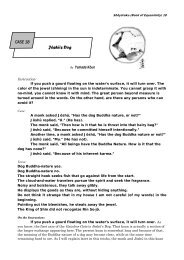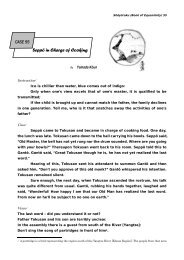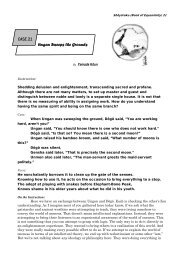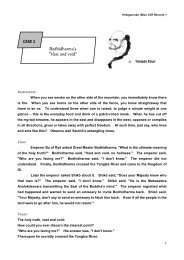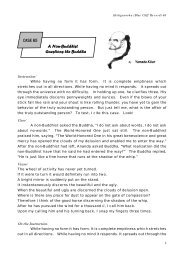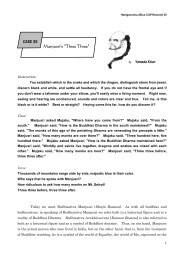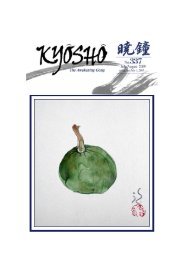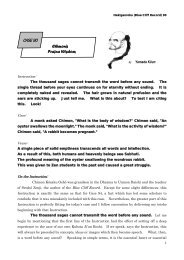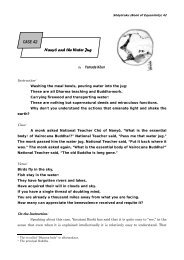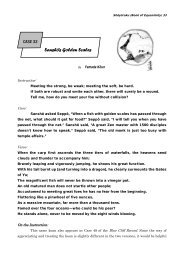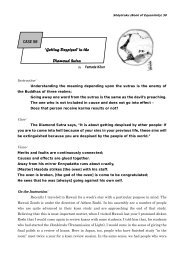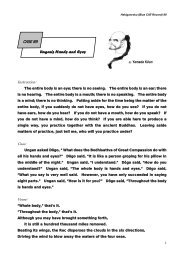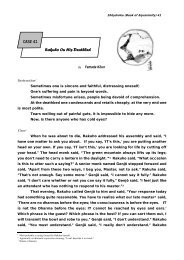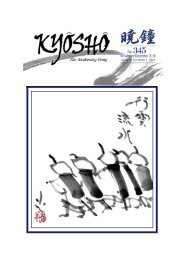Shoyoroku 69
Shoyoroku 69
Shoyoroku 69
Create successful ePaper yourself
Turn your PDF publications into a flip-book with our unique Google optimized e-Paper software.
Shôyôroku (Book of Equanimity) <strong>69</strong>whom this is referring to, it means the person known in the Shôdôka as the “leisurely person ofthe Tao, who has exhausted study and is without doing.” This is the state of consciousness of aperson who has exhausted all practice and reached a state of perfect peace of mind. To speak interms of becoming a Buddha or becoming a patriarch is just to use dirty names. Why is thename Buddha dirty? Why is the name patriarch dirty? Because words like Buddha or patriarchare all concepts. It is not there is actually anything like Buddha. It is just when there are nomore concepts in your head that we give it the name Buddha. It’s the same as me receiving thename Kyôzô Yamada. And there is really a person who hates the word Buddha. His name isShidô Bunan Zenji. As you might know, he was the teacher of Shôju Rôjin, who was the masterof Hakuin Zenji. I consider Shidô Bunan Zenji to be a truly outstanding person. I have writtenabout him in the Opening Comments of the latest issue of our magazine Kyôshô, so please havea look at it. Shidô Bunan Zenji was originally the innkeeper of a watering place along theTokaido Road at that time. He became a student of the Zen master Gudô Oshô. This Gudô Oshôtraveled back and forth several times between Kyoto and Edo (present-day Tokyo) along thishighway and evidently stayed at this inn a number of times. As a result, Shidô Bunan began toreceive the instruction of Gudô Oshô and eventually devoted himself to authentic practice. Hedecided to become a monk. Up to then he had devoted himself to carousing, to the extent thatthe family became quite disgusted with him. When I ask myself why he was carousing so much,I can surmise that he wanted everyone to think that he was no longer required at the inn, sothat he would then be free to become a monk. Once when Gudô Zenj was traveling from Kyototo Tokyo, he stayed overnight at the inn. The two men talked until deep in the night. The nextmorning Gudô Zenji continued on his way. Shortly after that, the master of the inn left home,never to return again. He went to Tokyo and practiced in a little hut-like dwelling. This wasprobably his continued practice after realizing enlightenment. As time went on, word gotaround that a very special person was living in the vicinity. Shôju Rôjin wanted to meet a trueZen master and traveled to Tokyo with that intention. I’m not sure if Shidô Bunan alreadycalled his hermitage Shidôan starting around that time, but at any rate Shôju Rôjin visited himin his dwelling. When he paid a visit, he found Shidô Bunan Zenji sitting in a ramshackledwelling on worn-out tatami matting. But one look was enough for him to confirm that he hadmet his true teacher. This really speaks well for Shôju Rôjin. Shidô Bunan Zenji was definitelynot a learned man, but he nevertheless wrote truly outstanding waka 2 poems. Alsooutstanding are his dôka or “songs of the way.” You would all do well to give them a perusal, ifyou have a chance. I have been looking over just the ones consisting of four lines. Many of themwarn us against being duped by the concept of Buddha (hotoke-sama). Here is an example:“Even if you fall head first into Avici hell, don’t ever think of becoming a Buddha” (sakashimani abijigoku e otsurutomo hotoke ni naru to sara ni omouna). The Avici hell is the most2 Waka (literally "Japanese poem") or Yamato uta is a genre of classical Japanese verse and one of the major genresof Japanese literature. The term was coined during the Heian period, and was used to distinguishJapanese-language poetry from kanshi (poetry written in Chinese by Japanese poets), and later from renga.2



